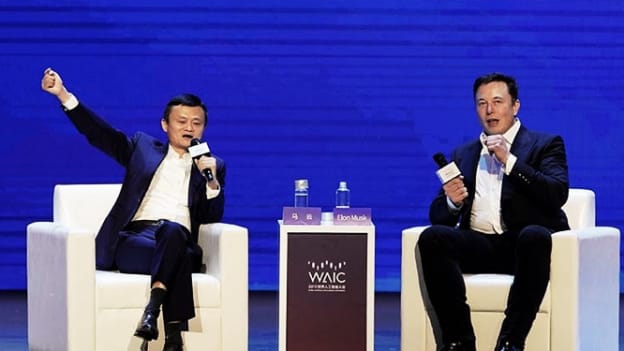The Future of Jobs and AI: Elon Musk and Jack Ma at WAIC

Speaking at the three-day WAIC in Shanghai, Tesla CEO Elon Musk and Alibaba Co-Founder and Executive Chairman Jack Ma found much to discuss regarding artificial intelligence, technology, education and the future of jobs. Although the two tech giants covered everything from gaming and civilization to the possibility of life on Mars, their discussions and differing opinions about jobs and AI were the most eye-opening from an HR perspective.
The discussion kicked off by asking: what new jobs will be created by AI, and has the change already started?
Ma seemed optimistic and even unconcerned about the advent of AI and its impact on the job market. “Every technology revolution people start to worry,” he said. “Actually, we made a lot of jobs. Secondly, because of the industrial revolution, jobs created a lot of jobs.”
Then, taking a fascinating swerve away from the question, Ma asked whether or not civilization even needed lots of jobs, moving the conversation on to a question of work-life balance, the standard of living and overall happiness. “People should work three days a week, four hours a day,” he said. “Because of artificial intelligence people will have more time to enjoy being human beings. The jobs we need should make people happier, make people experience life.” Again, he seemed positive. “I don’t worry about jobs. First: we’re going to have a lot of jobs. Second: we don’t need a lot of jobs.”
Musk had a less optimistic approach. “AI will make jobs kind of pointless,” he said, going on to claim that “probably the last job that will remain will be writing AI, and then eventually, the AI will just write its own software.” However, he agreed that jobs focusing on human interaction and art are still of some value. “If you’re working on something that involves people or engineering it’s probably a good approach,” he said.
Musk appears to believe we are running out of time with regards to leveraging artificial intelligence for human advantage. “We’re going to have to figure out this neuralink situation otherwise we will be left behind. It’s very important we do this quickly.” Neuralink refers to Musk’s plan to develop implantable brain-machine interfaces, merging humans and AI to achieve a productive symbiosis between the two.
Musk also seemed wary of claiming too much understanding of technology, hinting at the fact there’s much left undiscovered in the world of AI. “If you look at the topography of technology awareness,” Musk said. “It’s mostly flat with a few short buildings and some very tall spires. Unless you’re on that tall spire it’s not obvious what the topology is.”
Ma was emphatic that we shouldn’t worry too much about machines, stating that “man can never make another man [...] Computers only have chips, men have hearts.” A Computer might be clever (theoretical) but human as smarter (experience-driven), he mentioned “it is stupid to compete with a computer on playing chess, like it was to compete with cars in a race.”
Two future-facing thinkers who have revolutionary ways of looking at AI and how it will transform the world of work - for better or worse. While Ma has faith in the human ability to adapt, using these changes to increase our happiness, Musk has a more cautious approach, and believes the future of work - and even civilization itself - depends on humans combining to work with artificial intelligence before it outstrips us entirely.
Image Source: Bloomberg
















